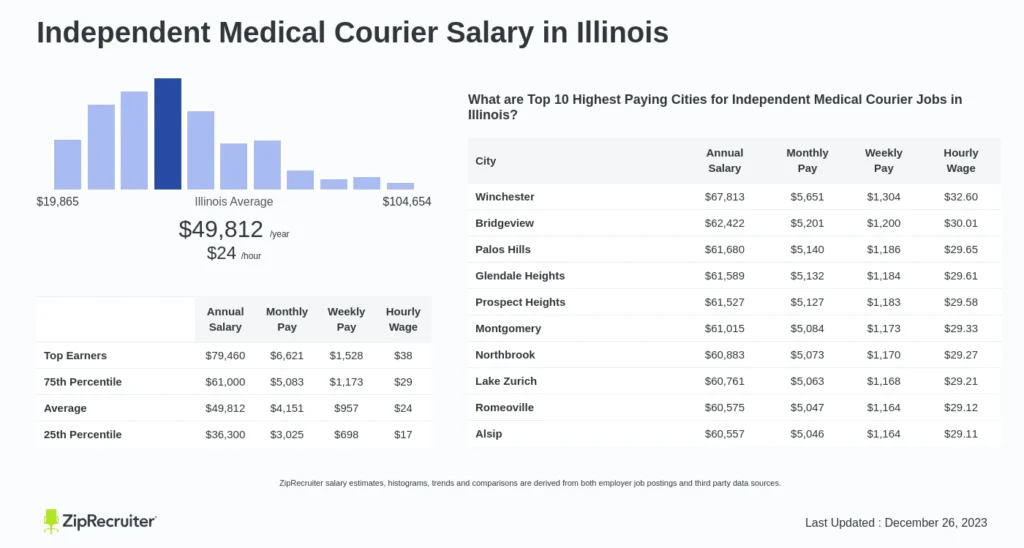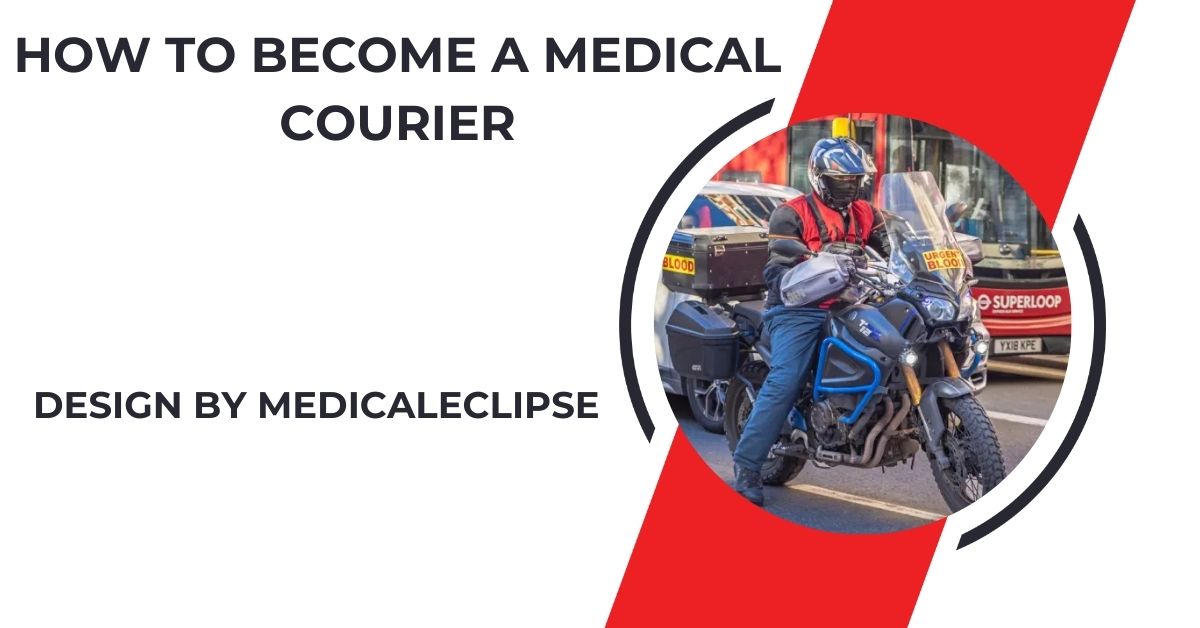Becoming a medical courier requires a high school diploma, valid driver’s license, and clean driving record. Specialized training in HIPAA and biohazard handling can help. Couriers transport medical items between healthcare facilities.
In this guide, we’ll walk through the steps on how to become a medical courier, the qualifications needed, job responsibilities, and the growing demand for this profession.
What Is a Medical Courier?

A medical courier is a specialized delivery professional responsible for transporting medical items between hospitals, clinics, labs, pharmacies, and patients. They ensure that items like lab samples, test results, medications, and medical equipment are delivered on time, often under strict time constraints and in compliance with health and safety regulations.
Steps to Become a Medical Courier:
Meet Basic Education Requirements:
While becoming a medical courier doesn’t require advanced education, having at least a high school diploma or GED is essential. Strong reading, writing, and math skills are crucial for managing deliveries and handling paperwork efficiently.
Have a Valid Driver’s License and Clean Driving Record:
A valid driver’s license is mandatory since the job revolves around driving. Employers will typically require a clean driving record with no serious violations or accidents, as it reflects your reliability and responsibility on the road.
Consider Getting Specialized Training:
Although not always required, some medical courier jobs may benefit from specialized training in handling medical specimens, HIPAA regulations, and biohazard materials. Courses in these areas can boost your employability and make you more competitive in the field.
- OSHA Training: Understanding the Occupational Safety and Health Administration (OSHA) standards related to the safe transportation of biohazards and medical materials can be valuable.
- HIPAA Compliance: Since medical couriers handle sensitive patient information and medical records, understanding the Health Insurance Portability and Accountability Act (HIPAA) is essential to ensure privacy and security.
Also Read: Can I Qualify For Medicaid If I Have Retirement Accounts – Medicaid and Retirement Accounts!
Obtain Necessary Equipment:
Most medical courier positions are independent contractor roles, meaning you’ll be responsible for your own vehicle and related equipment. Some key items you may need include:
- A reliable vehicle: Fuel-efficient cars or vans are ideal for long-distance or multiple deliveries.
- GPS or route mapping tools: Ensures timely deliveries with the most efficient routes.
- Insulated coolers and biohazard containers: For safe transport of medical specimens and pharmaceuticals that require specific temperature controls or handling.
Get Experience in the Logistics Field:
Prior experience in logistics, delivery services, or customer service can be helpful for building relevant skills. Working as a general courier, delivery driver, or even in warehouse environments can help you become familiar with the demands of transporting goods efficiently and on time.
Search for Medical Courier Job Opportunities:

Once you’re ready, you can start searching for job opportunities. Medical courier jobs can be found through healthcare companies, third-party courier services, hospitals, laboratories, and even pharmacies.
Some companies may hire you as a full-time employee, while others offer independent contractor positions. Search on job boards like Indeed, Glassdoor, or niche courier websites to find openings in your area.
Build Relationships with Healthcare Facilities:
Medical courier services often rely on trusted relationships with hospitals, clinics, and labs. If you’re starting independently, network within the healthcare industry to gain contracts and regular delivery routes. Establishing a reputation for reliability and punctuality can help you secure repeat business and long-term clients.
Stay Organized and Manage Time Effectively:
One of the most important skills for medical couriers is time management. Hospitals and labs depend on timely deliveries for patient care, so staying organized and using tools like route optimization apps can streamline your workload.
Also Read: What is Medical Chit – What You Should Know!
Stay Updated on Healthcare Delivery Regulations:
The healthcare industry is always evolving, and new regulations often impact how medical couriers must operate. Keep up with any changes in medical logistics, HIPAA laws, and safety protocols to ensure you’re compliant and delivering safely.
Medical Courier Job Responsibilities:
A medical courier’s job goes beyond simply picking up and delivering packages. Key responsibilities include:
- Transporting medical specimens and samples: Including blood, urine, and other lab specimens.
- Delivering medications and medical supplies: Such as prescription drugs, surgical instruments, or medical equipment.
- Following safety protocols: Ensuring that specimens and biohazard materials are handled safely and delivered in compliance with state and federal regulations.
- Maintaining delivery logs: Accurate record-keeping of delivery times, routes, and items transported.
- Ensuring HIPAA compliance: Protecting patient information and adhering to privacy laws when delivering medical records or sensitive documents.
Career Outlook and Salary for Medical Couriers:

With the growth of the healthcare industry, the demand for medical couriers is expected to increase. The rise in home healthcare services, lab testing, and pharmaceutical deliveries further drives the need for medical couriers.
- Salary: According to estimates, the average salary for a medical courier ranges between $30,000 to $45,000 per year, depending on location, experience, and whether you are an independent contractor or full-time employee. Couriers who handle high volumes or work in high-demand areas can potentially earn more.
- Job Growth: As healthcare needs continue to grow, especially with the aging population and increased testing services, the demand for reliable medical couriers is expected to rise. Additionally, the shift toward home healthcare services will provide more opportunities in the field.
Benefits of Becoming a Medical Courier:
- Flexible Hours: Many medical courier jobs offer flexibility, allowing you to manage your work schedule based on delivery times.
- Opportunity to Work Independently: Many couriers operate as independent contractors, giving them more control over their work hours and earnings.
- Contribution to Healthcare: Medical couriers play a critical role in supporting healthcare operations, ensuring timely delivery of essential medical supplies and patient care items.
FAQ’s
1.What qualifications are needed to become a medical courier?
A high school diploma, a valid driver’s license, and a clean driving record are required.
2.Is specialized training necessary?
Not always, but training in HIPAA regulations, OSHA standards, and biohazard handling is beneficial.
3.What equipment does a medical courier need?
A reliable vehicle, GPS, insulated coolers, and biohazard containers are essential.
4.Where can I find medical courier jobs?
You can find jobs through healthcare companies, third-party courier services, hospitals, and pharmacies.
5.What is the salary range for medical couriers?
Medical couriers typically earn between $30,000 and $45,000 per year, depending on location and experience.
Conclusion
Becoming a medical courier offers a fulfilling career for those who enjoy driving, appreciate flexible hours, and want to contribute to healthcare. With minimal education requirements and opportunities for independent work, it’s a stable profession with growing demand. Follow the steps in this guide to start a successful career ensuring the timely delivery of essential medical materials.
Related post
- Also Read: Is Paid Medical Employment Better Than Volunteer Medical Employment – What’s Best for You!
- Also Read: Campminder How To Set Up A Follow Up Medical Appointment – Boost Camp Health Efficiency!
- Also Read: When Do Admission Committee Meet For Sidnye Kimmel Medical School – Committee Schedule!

Leave a Reply